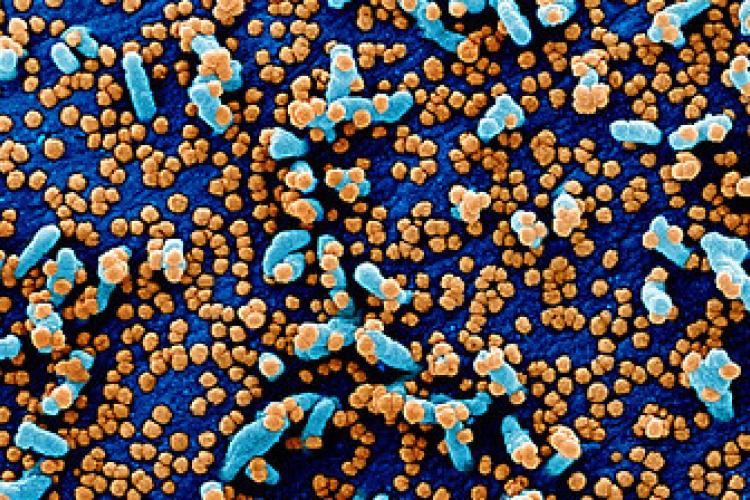IMI’s COMBACTE project is perfectly placed to support the DisCoVery studies of four potential COVID-19 therapies

* COMBACTE's role in DISCOVERY is changing due to the rapidly evolving situation. See this news item about the project's role in the Horizon 2020 project RECOVER: https://www.combacte.com/news/combacte-supports-covid-19-project-recover/
A study of potential coronavirus treatments, announced in March by the French national institute of health and medical research (INSERM), is receiving support from an IMI-funded network of clinical trial sites and laboratories. The INSERM coordinators contacted the team behind the IMI-funded COMBACTE-NET project to help recruit patients with COVID-19 and coordinate the clinical sites involved in the multicentre, multi-country study.
Read the press release: Launch of a European clinical trial against COVID-19
DisCoVery is a large, international, open randomised trial that features five study arms, including one on standard of care, three different antiviral treatments, and interferon beta 1a. The treatments were chosen by analysing data from the scientific literature on SARS and MERS coronaviruses as well as the first publications on SARS-CoV-2 from China. They are remdesivir, lopinavir and ritonavir in combination, the latter being administered with or without interferon beta 1a and hydroxychloroquine.
Prof. Dr. Marc Bonten from University Medical Centre Utrecht and academic leader for COMBACTE-NET says, “These are drugs that in the lab in vitro and in animal models have an effect on the virus, but we don't know whether that effect can also be reproduced in the patient.”
“What (INSERM) needed was to be able to identify the sites that could move rapidly because this is a race against the clock,” he says. “We were able to identify in our network the sites that we think can manage this problem of having this set up in in a few weeks’ time. We are now setting up sites for them in the Netherlands, Belgium, and Luxemburg.”
“Exactly what we had in mind”
“We decided we would start with the BeNeLux countries and then invite more countries to join, such as the United Kingdom, Ireland, Germany, Italy, and Spain because otherwise logistically it becomes very challenging,” says Prof Herman Goossens, of the University Hospital Antwerp and leader of LAB-Net. CLIN-Net and LAB-Net were created as part of the COMBACTE-NET project, and together form a network of hospitals and microbiology laboratories capable of recruiting, treating, monitoring and reporting data in multinational, multicentre trials at all stages of clinical drug development. The networks consists of more than one thousand hospitals and 800 labs in 42 European countries.
The infrastructure of the networks CLIN-Net and LAB-Net match the requirements of the trials. The other advantage is the relationships that have already been established over the years: “The reason these networks were so attractive for the DisCoVery trial is that we have the infrastructure with the hospitals and labs, and we already have contact with the people in these hospitals and labs,” says Herman. “We know how to reach out to them, and we know the IRBs (Institutional Review Boards), and the most important thing when setting up a clinical trial is to get rapid approval from the IRB.”
“This is exactly what we had in mind years ago when we said we wanted to build a European clinical research alliance where you connect the infrastructure for clinical trials for emerging infectious diseases,” he adds. Herman will also coordinate a newly-launched the H2020 project called RECOVER, part of the European response to the COVID-19 pandemic. As part of that project COMBACTE-Net’s established clinical and laboratory network will also be used to study disease spectrum and severity, risk factors, spread and outcomes of COVID-19 in patients in hospital care.
Survival of the fittest (antiviral)
The DisCoVery trial has five arms with a total of 3,200 patients which means 640 patients per arm. Marc Bonten explains that it’s an adaptive trial with frequent interim analysis. “Based on the results in the trial, the randomisation can be adapted and the ‘least performing’ drug can be stopped. And the best performing can be, let's say, preferentially randomised in order to have the best situation for patients.”
This way, analysis is done repeatedly. “The classical approach is that you would have a fixed randomisation and that will continue until you had enrolled a set number of patients and then the analysis would be done. With an adaptive design, we don't wait until all 3,200 patients have been enrolled; the analysis is done by an independent committee repeatedly, and based on information that comes forward from these analyses, more patients can be randomised to the more promising treatments.”
Racing against the clock
“The timeline for this will depend on the effect of the different treatments, as in how much difference we see between the groups - and also how many patients will be enrolled. The more patients, the more power we have to get a result. These are the two unknowns, and I'm expecting that it will take at least a few weeks before we will have a first outcome,” says Marc.
As to whether there is one antiviral that they are more hopeful about than the others, he says he has no idea. “It’s a complete unknown. I have never worked under this kind of time pressure before. It feels like an adventure – a very important adventure.”
